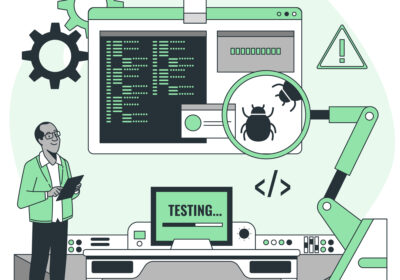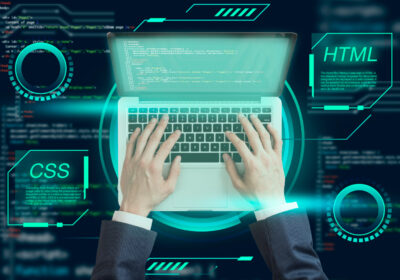The software development landscape is undergoing a metamorphosis, fueled by the relentless march of Artificial Intelligence (AI). From automating repetitive tasks to generating code snippets and even suggesting design patterns, AI tools are rapidly altering the way we approach software development. This begs the crucial question: Does AI pose a threat to the future of human developers, or is it a powerful partner poised to usher in a new era of development efficiency and innovation?
AI’s influence extends far beyond a simple presence in the software development world. Its impact is woven into the very fabric of the software development lifecycle (SDLC), transforming various stages. Here are some of the key areas where AI is making its mark:
Automating the Mundane
Software development is often riddled with repetitive tasks that can be tedious and time-consuming. These include activities like writing boilerplate code for functionalities that are common across many applications (e.g., user login systems, data validation checks). AI excels at automating these tasks, freeing up valuable developer time for more strategic endeavors. Imagine a developer no longer needing to spend hours crafting the same login functionality from scratch for every new project. With AI-powered code generation tools, developers can simply specify the desired functionality, and the AI can generate the necessary code, complete with security best practices and error handling mechanisms built-in.
Beyond Automation
AI-Powered Code Review and Analysis While automation is a clear benefit, AI’s impact goes beyond simply replacing human effort. AI-powered tools can act as a virtual code review partner for developers, analyzing code for potential bugs, security vulnerabilities, and inefficiencies. These tools can leverage vast repositories of code and best practices to identify areas where the code could be optimized or refactored for better performance or maintainability. For instance, AI can detect code that might be susceptible to common security vulnerabilities like SQL injection attacks or cross-site scripting (XSS).
Intelligent Code Completion
A Developer’s Muse Imagine a world where developers don’t have to spend hours searching for specific code libraries or functionalities. This is the reality that AI-powered code completion tools are helping to create. These tools analyze the context of the code being written and suggest relevant code snippets or functionalities that might be applicable. For example, if a developer is writing code to handle user input validation, the AI might suggest pre-built functions for common validation checks like email address format or numeric input. This significantly reduces the time developers spend searching for code or referencing documentation, accelerating the coding process and improving developer productivity. Furthermore, AI can learn from a developer’s coding style and preferences over time. By analyzing a developer’s past coding habits and frequently used libraries, AI can offer increasingly personalized suggestions, anticipating the developer’s needs and becoming a more effective coding partner.
Generating New Designs
A Springboard for Human Creativity While AI might not be ready to replace human designers entirely, it can play a valuable role in the initial stages of the design process. AI algorithms can analyze user data and design trends to generate initial prototypes for user interfaces (UIs). These prototypes might not be production-ready, but they can serve as a valuable springboard for human designers.
The Power of Human-AI Collaboration: A Symbiotic Relationship
While AI undeniably automates tasks and streamlines workflows, it’s crucial to recognize that it is not a replacement for human developers. The true power lies in harnessing the complementary strengths of AI and human intelligence. Here’s why a collaborative approach between humans Here’s why a collaborative approach between humans and AI is the key to success in software development:
- Understanding the Nuances: Where Human Expertise Shines AI excels at pattern recognition and data analysis, but it currently lacks the ability to grasp the nuanced context and specific requirements of a software project. These projects are often driven by complex business needs and user expectations that go beyond the realm of data and algorithms. Human developers, on the other hand, possess the critical thinking skills and domain knowledge necessary to translate these business needs into clear technical specifications.
- Creativity and Innovation: The Human Edge in Problem-Solving Software development is not just about writing code; it’s about crafting innovative solutions that address complex problems. While AI can assist with automation and code generation, human creativity remains irreplaceable in devising novel solutions and architecting complex software systems. Developers can leverage their understanding of the problem domain, user needs, and technological possibilities to come up with creative approaches that AI might not be able to conceive on its own. Imagine a developer tasked with building a recommendation engine for an e-commerce platform.
- The Human Touch: Empathy in User Experience Design Software development isn’t solely a technical endeavor; it often involves understanding user needs and designing intuitive interfaces that resonate with them. This is where human empathy and emotional intelligence come into play. Developers need to be able to put themselves in the shoes of the users and understand their frustrations, pain points, and desired experiences. While AI can offer data-driven insights into user behavior, it cannot replicate the human ability to empathize with users and design experiences that are not just functional but also emotionally engaging.
The Future of AI in Software Development: A Collaborative Evolution
As AI technology continues to evolve, we can expect its role in software development to become even more pervasive. However, the future lies not in AI replacing developers but rather in AI augmenting human capabilities. Here’s a glimpse into what the future holds:
More Sophisticated AI Tools:
Beyond Automation The future of AI tools in software development goes beyond simply automating tasks. We can expect to see AI tools that are capable of not just automating code generation but also understanding the underlying logic and intent behind the code.
Focus on Developer Efficiency:
Empowering, Not Replacing The primary focus in the future will not be on AI replacing developers but rather on AI tools being designed to streamline workflows, eliminate tedious tasks, and free up developer time for higher-level problem-solving and strategic thinking. Imagine a development environment where AI handles the mundane tasks of code generation, unit test creation, and bug detection, allowing developers to focus on the more creative aspects of software development, such as designing innovative solutions, architecting complex systems, and crafting exceptional user experiences.
A Symbiotic Relationship:
Humans and AI Working Together The ideal future state of AI in software development is a symbiotic relationship between humans and AI. Developers will utilize AI tools to enhance their productivity and creativity, while AI will continue to learn and evolve from human input and collaboration. This collaborative approach will allow developers to achieve new heights of efficiency and innovation, ultimately leading to the creation of groundbreaking software solutions that address the evolving needs of the digital world.
Conclusion: A Promising Partnership for the Future
The rise of AI in software development is not a cause for alarm for human developers; it’s an exciting opportunity for the rise of AI in software development is not a cause for alarm for human developers; it’s an exciting opportunity for a paradigm shift. By embracing AI as a powerful partner, developers can unlock new levels of efficiency, innovation, and problem-solving capabilities.
As AI technology continues to evolve, the software development landscape will undoubtedly continue to transform. However, by embracing this change and fostering a collaborative partnership between humans and AI, we can unlock a future filled with groundbreaking software solutions that shape the way we live, work, and interact with the world around us.





